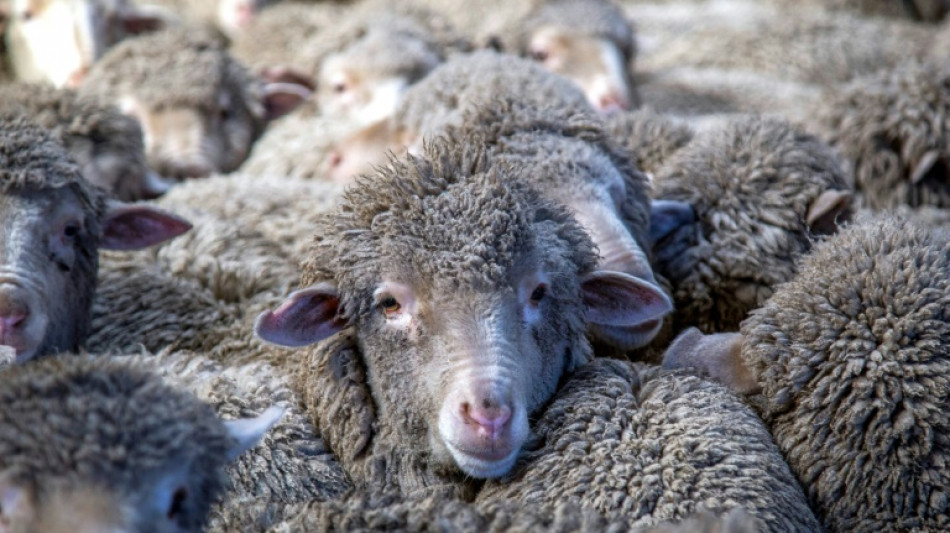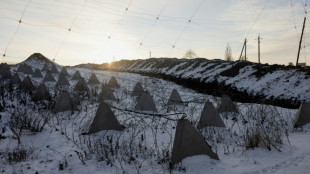
-
 Japan inflation eases in welcome news for PM Takaichi
Japan inflation eases in welcome news for PM Takaichi
-
McIlroy shares Riviera clubhouse lead as Rai charges, Scheffler fades

-
 Philippines' Duterte earned global infamy, praise at home
Philippines' Duterte earned global infamy, praise at home
-
Stocks drop, oil rises after Trump Iran threat

-
 As European heads roll from Epstein links, US fallout muted
As European heads roll from Epstein links, US fallout muted
-
Families of Duterte's drug war victims eye Hague hearing hopefully

-
 Russian decision is a betrayal: Ukrainian Paralympics chief
Russian decision is a betrayal: Ukrainian Paralympics chief
-
Venezuela parliament unanimously approves amnesty law

-
 Martinez missing as Inter limp to Lecce after Bodo/Glimt humbling
Martinez missing as Inter limp to Lecce after Bodo/Glimt humbling
-
India chases 'DeepSeek moment' with homegrown AI models

-
 World leaders to declare shared stance on AI at India summit
World leaders to declare shared stance on AI at India summit
-
'Everything was removed': Gambians share pain with FGM ban in balance

-
 Kim Jong Un opens rare party congress in North Korea
Kim Jong Un opens rare party congress in North Korea
-
Ex-Philippine leader Duterte faces pre-trial ICC hearing

-
 Japanese star Sakamoto 'frustrated' at missing Olympic skating gold
Japanese star Sakamoto 'frustrated' at missing Olympic skating gold
-
Japan inflation eases in welcome news for Takaichi

-
 FIFA to lead $75m Palestinian soccer rebuilding fund
FIFA to lead $75m Palestinian soccer rebuilding fund
-
Chicago Bears take key step in proposed Indiana stadium move

-
 Liu captures Olympic figure skating gold as US seal hockey glory
Liu captures Olympic figure skating gold as US seal hockey glory
-
North Korea opens key party congress

-
 Los Angeles sues Roblox over child exploitation claim
Los Angeles sues Roblox over child exploitation claim
-
Golden Liu puts US women back on top of Olympic women's figure skating

-
 Hodgkinson sets women's 800m world indoor record
Hodgkinson sets women's 800m world indoor record
-
USA's Alysa Liu wins Olympic women's figure skating gold

-
 Man Utd cruise into Women's Champions League quarters
Man Utd cruise into Women's Champions League quarters
-
Gu reaches Olympic halfpipe final after horror crash mars qualifiers

-
 Keller overtime strike gives USA Olympic women's ice hockey gold
Keller overtime strike gives USA Olympic women's ice hockey gold
-
NASA delivers harsh assessment of botched Boeing Starliner test flight

-
 US Fed Governor Miran scales back call for rate cuts this year
US Fed Governor Miran scales back call for rate cuts this year
-
Gu qualifies for Olympic halfpipe final marred by horror crash

-
 Trump issues Iran with ultimatum as US ramps up military presence
Trump issues Iran with ultimatum as US ramps up military presence
-
Peru's brand-new president under fire for child sex comments

-
 UK police hold ex-prince Andrew for hours in unprecedented blow
UK police hold ex-prince Andrew for hours in unprecedented blow
-
Former Olympic freeski halfpipe champion Sharpe crashes heavily

-
 Former Olympic champion Sharpe suffers heavy halfpipe crash
Former Olympic champion Sharpe suffers heavy halfpipe crash
-
Belarus says US failed to issue visas for 'Board of Peace' meeting

-
 Forest boss Pereira makes perfect start with Fenerbahce rout in Europa play-offs
Forest boss Pereira makes perfect start with Fenerbahce rout in Europa play-offs
-
Alcaraz fights back to book last four berth in Qatar

-
 England captain Itoje warns of 'corrosive' social media after abuse of Ireland's Edogbo
England captain Itoje warns of 'corrosive' social media after abuse of Ireland's Edogbo
-
War-weary Sudanese celebrate as Ramadan returns to Khartoum

-
 Townsend expects recalled Scotland duo to shine in Six Nations clash with Wales
Townsend expects recalled Scotland duo to shine in Six Nations clash with Wales
-
Peru's new president under fire for child sex comments

-
 UK king opens London fashion week despite brother's arrest
UK king opens London fashion week despite brother's arrest
-
Belarus frees opposition politician Statkevich

-
 Striking Argentine workers slow down Buenos Aires in protest over labor reforms
Striking Argentine workers slow down Buenos Aires in protest over labor reforms
-
Starlink loss a blow to Russian forces in Ukraine: experts

-
 UN's Sudan probe finds 'hallmarks of genocide' in El-Fasher
UN's Sudan probe finds 'hallmarks of genocide' in El-Fasher
-
Belarus frees opposition politician Statkevich: wife

-
 Rocket re-entry pollution measured in atmosphere for first time
Rocket re-entry pollution measured in atmosphere for first time
-
Airbus ready to build two new European fighters if countries want


New Zealand farmers battle pine forests to 'save our sheep'
New Zealand sheep farmers are fighting to stop the loss of pasture to fast-spreading pine plantations, which earn government subsidies to soak up carbon emissions.
Concern over the scale of the farm-to-forest switch led the government to impose a moratorium in December on any new conversions not already in the pipeline.
But farmers say forestry companies are flouting the clampdown.
Last month, farmers launched a "Save our Sheep" campaign to reverse the loss of productive farmland.
Sheep numbers have plummeted to around 23 million, down from a peak of around 70 million in the 1980s, according to official figures.
Falling wool prices and rising milk and beef costs initially drove the decline, but the emissions trading since 2008 has added to the strain.
The government is now investigating potential breaches of its moratorium by forestry companies, which have been buying up farmland as recently as June.
Federated Farmers -- a lobby group for rural communities -- submitted to the government "a list of properties we believe have been sold for carbon forestry" since the halt, a spokesman said.
The federation is concerned about the sale of more than 15,200 hectares (37,600 acres) of farmland, he told AFP.
Dean Rabbidge, who runs a farm outside the Southland town of Wyndham, said some of the newly purchased farms had already been planted with pine trees.
- 'Criminal' -
"They're just ploughing on ahead, effectively giving the middle finger to the government announcement," Rabbidge told AFP.
The moratorium had created a "gold rush", he said.
"It's criminal what's happening."
Agriculture and Forestry Minister Todd McClay said the government would change the law by October because it had become more profitable to plant pine forests than to farm sheep.
"The law will include clarity on what qualifies as legitimate evidence of a pre-December investment and enable any specific cases to be properly assessed," McClay said.
"Anyone who has bought land since December 4, 2024, irrespective of whether they also had trees or not, will not be able to register this land into the emissions trading scheme."
Rural New Zealand once abounded with rolling pastures, rickety wire fences hemming in millions of sheep chewing on the green grass.
But Rabbidge said those days were gone.
"You won't see anything now," he said. "You're just driving through long pine tree tunnels -- shaded, wet, and damp."
New Zealand is one of the rare countries to allow 100 percent of carbon emissions to be offset by forestry.
"We're not anti planting trees," sheep farmer Ben Fraser told AFP.
"There are areas of land that should be retired, that aren't necessarily productive."
But the trading scheme had driven an excessive loss of sheep pastures to forestry, he said.
"That's the issue here."
- 'So short-sighted' -
Fraser, who farms near the North Island town of Ohakune, said he had seen an exodus of people from the district in recent years.
"Since 2018, there've been 17 farms converted to forestry," he said.
"That's about 18,000 hectares gone. So you're looking at about 180,000 sheep gone out of the district, plus lambs."
The loss of sheep impacted the region.
"If the farms thrive, then the towns thrive because people come in and spend their money," he said.
"You've got farm suppliers, your fertiliser guys, your supermarkets, your butchers, all of that stuff struggling.
"The local schools now have less kids in them. The people who stayed are now isolated, surrounded by pine trees."
Rabbidge said the same was happening in Southland.
"This whole thing is just so short-sighted," Rabbidge said.
"Businesses here are forecasting anywhere between a 10 and 15 percent revenue reduction for the next financial year, and that's all on the back of properties that have sold or have been planted out in pine trees," he said.
- 'Lamb on a plate' -
"Think of all the shearers, the contractors, the transporters, the farm supply stores, the workers, the community centres, the schools, rugby clubs. Everything is affected by this."
Government figures from 2023 show agriculture accounted for more than half of New Zealand's total greenhouse gas emissions.
But farmers argue they have been working hard to reduce emissions, down more than 30 percent since the 1990s.
"I could put a leg of lamb on a plate in London with a lower emissions profile, transport included, than a British farmer," Rabbidge said.
"We just use our natural resources. We're not housing animals indoors and carting feed in and manure out.
"Everything's done outside and done at low cost, low and moderate intensity."
O.Karlsson--AMWN



